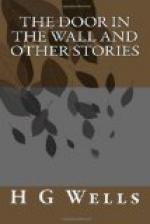“Out of the world. Over mountains and glaciers; right over above there, half-way to the sun. Out of the great, big world that goes down, twelve days’ journey to the sea.”
They scarcely seemed to heed him. “Our fathers have told us men may be made by the forces of Nature,” said Correa. “It is the warmth of things, and moisture, and rottenness—rottenness.”
“Let us lead him to the elders,” said Pedro.
“Shout first,” said Correa, “lest the children be afraid. This is a marvellous occasion.”
So they shouted, and Pedro went first and took Nunez by the hand to lead him to the houses.
He drew his hand away. “I can see,” he said.
“See?” said Correa.
“Yes; see,” said Nunez, turning towards him, and stumbled against Pedro’s pail.
“His senses are still imperfect,” said the third blind man. “He stumbles, and talks unmeaning words. Lead him by the hand.”
“As you will,” said Nunez, and was led along laughing.
It seemed they knew nothing of sight.
Well, all in good time he would teach them.
He heard people shouting, and saw a number of figures
gathering together in the middle roadway of the village.
He found it tax his nerve and patience more than he had anticipated, that first encounter with the population of the Country of the Blind. The place seemed larger as he drew near to it, and the smeared plasterings queerer, and a crowd of children and men and women (the women and girls he was pleased to note had, some of them, quite sweet faces, for all that their eyes were shut and sunken) came about him, holding on to him, touching him with soft, sensitive hands, smelling at him, and listening at every word he spoke. Some of the maidens and children, however, kept aloof as if afraid, and indeed his voice seemed coarse and rude beside their softer notes. They mobbed him. His three guides kept close to him with an effect of proprietorship, and said again and again, “A wild man out of the rocks.”
“Bogota,” he said. “Bogota. Over the mountain crests.”
“A wild man—using wild words,” said Pedro. “Did you hear that—
“Bogota? His mind has hardly formed yet. He has only the beginnings of speech.”
A little boy nipped his hand. “Bogota!” he said mockingly.
“Aye! A city to your village. I come from the great world—where men have eyes and see.”
“His name’s Bogota,” they said.
“He stumbled,” said Correa—“stumbled twice as we came hither.”
“Bring him in to the elders.”
And they thrust him suddenly through a doorway into a room as black as pitch, save at the end there faintly glowed a fire. The crowd closed in behind him and shut out all but the faintest glimmer of day, and before he could arrest himself he had fallen headlong over the feet of a seated man. His arm, outflung, struck the face of someone else as he went down; he felt the soft impact of features and heard a cry of anger, and for a moment he struggled against a number of hands that clutched him. It was a one-sided fight. An inkling of the situation came to him and he lay quiet.




